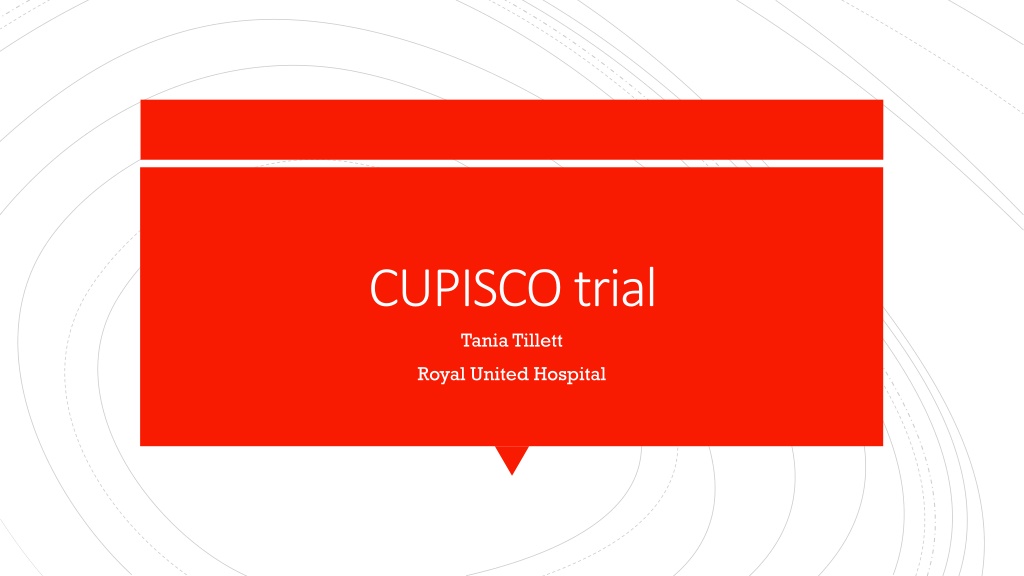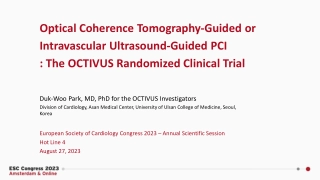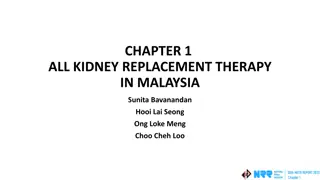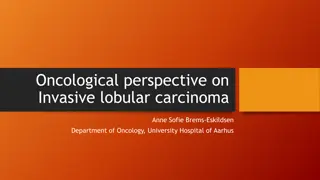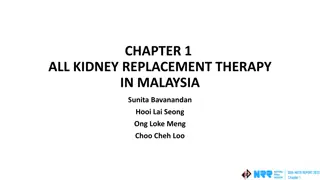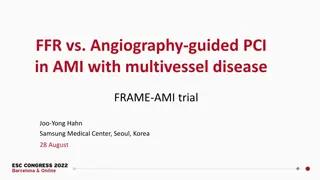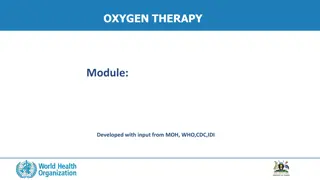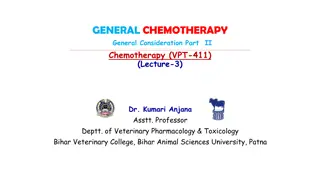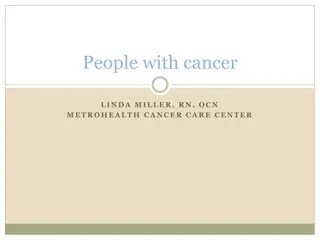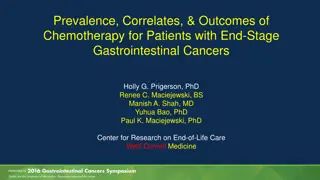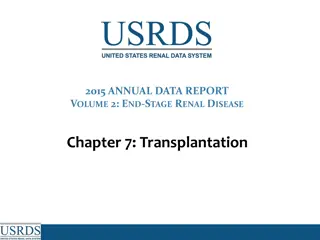Molecularly-Guided Therapy vs Platinum Chemotherapy in CUP Patients
This trial aims to compare the efficacy and safety of molecularly-guided therapy or cancer immunotherapy based on genomic profiling with platinum-based chemotherapy in patients with cancer of unknown primary site. The study design includes multiple treatment regimens guided by genomic profiles, with primary endpoints focused on evaluating the best response to platinum induction chemotherapy. Patients meeting inclusion criteria will undergo various targeted therapies based on their molecular tumor profiles. The trial also emphasizes the importance of molecular tumor board discussions and initial testing for all patients. The primary endpoint is pooled progression-free survival in responders, while the secondary endpoint includes overall survival analysis among other assessments. Patients must be over 18 years old with histologically confirmed cancer of unknown primary site to participate.
Download Presentation

Please find below an Image/Link to download the presentation.
The content on the website is provided AS IS for your information and personal use only. It may not be sold, licensed, or shared on other websites without obtaining consent from the author. Download presentation by click this link. If you encounter any issues during the download, it is possible that the publisher has removed the file from their server.
E N D
Presentation Transcript
CUPISCO trial Tania Tillett Royal United Hospital
A PHASE II, RANDOMIZED, ACTIVE- CONTROLLED, MULTI-CENTER STUDY COMPARING THE EFFICACY AND SAFETY OF TARGETED THERAPY OR CANCER IMMUNOTHERAPY GUIDED BY GENOMIC CUPSICO PROFILING VERSUS PLATINUM-BASED CHEMOTHERAPY IN PATIENTS WITH CANCER OF UNKNOWN PRIMARY SITE WHO HAVE RECEIVED THREE CYCLES OF PLATINUM DOUBLET CHEMOTHERAPY
To evaluate the efficacy of molecularly-guided therapy versus platinum chemotherapy in patients with CUP whose best response to 3 cycles of platinum induction chemotherapy was confirmed CR, PR or SD Primary Endpoint
MX39795 study design awaiting final UK approvals Inclusion criteria Histologically confirmed CUP (non-specific subset) No prior lines of therapy ECOG PS 0 1 1 measurable lesion N=790 Category 1 Alectinib (ALK or RET rearrangements) Erlotinib + bevacizumab (EGFR Mut+) Investigator choice (following Molecular Tumour Board advice) n=354 Trastuzumab + pertuzumab + continued induction chemo (ERBB2) Vismodegib (PTCH1, SUFU or SMO) Genomic profiling Tissue* and blood Vemurafenib + cobimetinib (BRAF MutV600) Ipatasertib (AKT1 or PI3K) Responders CR, PR or SD n=472 (60%) Olaparib (BRCA1, BRCA2 or HRD) R plus select biomarkers (e.g. PD-L1) 3:1 Atezolizumab (TMB high or MSI-high) Atezolizumab + continued induction chemo (patients with no other option) Induction Carboplatin + paclitaxel or cisplatin + gemcitabine (3 cycles) Carboplatin + paclitaxel or cisplatin + gemcitabine (3 cycles) Screening n=118 Category 2 Non-responders PD or intolerable toxicity n=318 (40%) Investigator choice (following Molecular Tumour Board advice) Primary endpoint: pooled PFS from 9 molecularly guided regimens vs chemo in responders to induction chemo [PFS1] Assigned as per randomised arm Secondary endpoint: OS *Tissue sample suitable for initial diagnosis of CUP at study site, confirmation of CUP diagnosis and generation of Foundation One comprehensive genomic profile at central laboratory Sample suitable for analysis of circulating tumour DNA using FoundationACT assay
At trial entry all patients will have tissue and blood send for Foundation Act and Foundation One testing in readiness of MTB discussion if necessary Tissue and blood samples (MTB = molecular tumour board)
Over 18 years of age Histologically-confirmed cancer of unknown primary site (CUP)(non-specific subset) according to criteria from the European Society for Medical Oncology, version 1 (ESMO v1) Each patient must provide a blood sample for genomic profiling No prior lines of systemic therapy for the treatment of CUP Inclusion Criteria Eastern Cooperative Oncology Group (ECOG) performance status of 0 or 1 Candidate for platinum-based doublet chemotherapy At least one measurable lesion according to Response Evaluation Criteria In Solid Tumors, version 1.1 (RECIST v1.1) Formalin-Fixed Paraffin-Embedded (FFPE) tumor tissue sample that is sufficient for generation of a comprehensive genomic profile at a central reference pathology laboratory
Squamous cell CUP History or known presence of leptomeningeal disease Known human immunodeficiency virus (HIV) infection Exclusion Criteria Significant cardiovascular disease Prior allogeneic stem cell or solid organ transplantation Pregnancy or breastfeeding, or intention of becoming pregnant during study treatment or within 90 days after the last dose of study treatment
Alectinib will be administered orally at the label-recommended dose (600 mg) twice daily until disease progression or unacceptable toxicity, through the end of the study (approximately 48 months). Vismodegib will be administered orally at the label-recommended dose (150 mg) once daily until disease progression or unacceptable toxicity, through the end of the study (approximately 48 months). Ipatasertib will be administered orally at the label-recommended dose (400 mg) once daily until disease progression or unacceptable toxicity, through the end of the study (approximately 48 months). Olaparib will be administered orally at the label-recommended dose (400 mg) twice daily until disease progression or unacceptable toxicity, through the end of the study (approximately 48 months). Erlotinib will be administered orally in combination with Bevacizumab at the label recommended dose (150 mg) once daily until disease progression or unacceptable toxicity, through the end of the study (approximately 48 months) Bevacizumab will be administered intravenously at 15mg/kg every 3 weeks in combination with Erlotinib until disease progression or unacceptable toxicity, through the end of the study (approximately 48 months) Drugs Vemurafenib will be administered orally, 960 mg twice daily, in combination with Cobimetinib, until disease progression or unacceptable toxicity, through the end of the study (approximately 48 months) Cobimetinib will be administered orally, 60mg once daily, in combination with Vemurafenib, until disease progression or unacceptable toxicity, through the end of the study (approximately 48 months) Trastuzumab will be administered subcutaneously, 600 mg every 3 weeks, in combination with Pertuzumab and chemotherapy, until disease progression or unacceptable toxicity, through the end of the study (approximately 48 months) Pertuzumab will be initially be administered intravenously, 840 mg, followed by 420 mg every 3 weeks, in combination with Trastuzumab and chemotherapy, until disease progression or unacceptable toxicity, through the end of the study (approximately 48 months) Atezolizumab will be administered intravenously at the label-recommended dose (1200 mg) every 3 weeks until disease progression or unacceptable toxicity, through the end of the study (approximately 48 months).
The trials initiator and lead, Dr Harpreet Wasan of Hammersmith Hospital and Imperial College London, writes: We hope to recruit 77 patients in total to test the benefit of immunotherapy in CUP and hope also to find tests (bio markers ) in the patients who get benefit from the immunotherapy The trial is awaiting ethical approval and we hope to be recruiting patients by the end of this Summer . [Apr 18] CUPEM trial It has been agreed that the trial will run from 3 London Centres: Hammersmith (co-ordinating Centre), Guy s /St Thomas s and the Royal Marsden.
